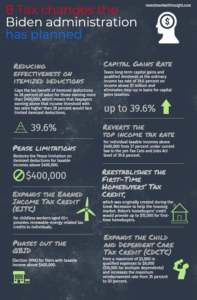A lack of political clarity means not knowing whether Democrats can push their legislative agenda faster. If Democrats gain control of the US Senate, Republicans won’t have the control to force legislation gridlock. Therefore, without this crucial information year end planning just got much more difficult as the decision to who has control of the Senate is likely not coming until January 5th, 2021.
Currently, Republicans are likely to keep control of the Senate; however, if Democrats seize the two seats in Georgia, then a 50/50 split would mean VP Kamala Harris gets the deciding vote which means Democrats control the Senate.
The question is to act now before years end and push a lot of income to 2020 or hold off and risk having to pay almost twice as much in taxes if the tax code legislation gets passed. Under the Biden administration, the current proposal has ordinary income tax rates for those making $400,000 a year or more increasing substantially and long term capital gains tax rate equal to ordinary income tax rates when in excess of 1 million. For those earners earning just over $400,000 the tax hit will be a tough pill to swallow. The tax on long term capital gains would be at ordinary income tax rates to the extent gains are in excess of >$1mm of income (including non-capital gain income).
 One strategy is doing a Roth Conversion (or a Back Door Roth). In short, taking money out of your IRA and converting it to your Roth so you pay taxes now for the long term play of those assets growing tax free). Unfortunately, since the Republicans passed the Tax Cuts and Jobs Act this decision is now irrevocable. Previously, you used to be able to do a conversion, wait to see if tax law changed, and if it did where it wasn’t beneficial to have done the conversion then you could recharacterize it and pretend you never did it. Now that conversion becomes irrevocable making the decision a more calculated one.
One strategy is doing a Roth Conversion (or a Back Door Roth). In short, taking money out of your IRA and converting it to your Roth so you pay taxes now for the long term play of those assets growing tax free). Unfortunately, since the Republicans passed the Tax Cuts and Jobs Act this decision is now irrevocable. Previously, you used to be able to do a conversion, wait to see if tax law changed, and if it did where it wasn’t beneficial to have done the conversion then you could recharacterize it and pretend you never did it. Now that conversion becomes irrevocable making the decision a more calculated one.
In 2020, the highest capital gains tax rate is 20%. In 2021, the Biden administration has proposed an increase to 39.6%. This increase has a huge impact on whether or not you take gains now and harvest some of your profits as you could potentially decrease your rate by almost half depending on your tax rate. Now these changes will probably not go into effect until 2022, understanding future tax implications will be key as you head into possibly the last year in the next 4 of low tax rates.
Furthermore, as if the situation isn’t already complicated, the Biden administration proposed eliminating the step-up in basis of capital assets at death. For those looking to pass highly appreciated assets to loved ones so they can capitalize on the step up in cost basis which used to be a great strategy, would now force their beneficiaries to pay all taxes on appreciated assets at death which could push them into the highest bracket.
A potential increase in taxes in 2021 means accelerating income and deferring deductions when they’re more valuable in 2021. However, if you’re already itemizing deductions then you may benefit from claiming your deductions this year as the new Biden administration proposal would cap itemized deductions benefit at 28%. It may be beneficial to defer for all income earners any deduction that won’t be counted in 2020 into 2021 if there is a chance the rules change. So for example, if you had a $100 of income at the 37% rate then you’d only get a 28% deduction moving forward.
The Qualified Business Income (QBI) under the Biden Proposal could potentially vanish as well. So for small to midsize businesses that aren’t specified service trade companies this will have a substantial impact on their tax liability. The current QBI is a 20% deduction on income <$400,000 and without that decrease income business owners could face a large jump in their tax rate. This now increases the potential benefit to accelerate business income into 2020.
Another change could come from SALT legislation. What will happen to the $10,000 SALT next year? This year, 2020, most likely nothing is going to change. But next year, if you’ve already reached your 10k limit on SALT then paying them today has zero benefit; however, pushing your estimated tax payments or deferring your property tax till Jan 1, 2021 at least gives you a chance to benefit.
Looking ahead, there could potentially be a large shift in how we use retirement vehicles. The current plans clearly benefit high income earners by making large contributions to IRAs/401ks and reducing their income tax liability dollar for dollar while lower income earners benefit from contributing to Roth IRAs at currently low tax rates and letting that money grow tax-free. However, with the proposal now, the lower your income the more it makes sense to use a Traditional IRA, and the higher the income, the Roth is more likely to give you a better tax break.
The higher your marginal rate is over ~26% the more it makes sense to use a Roth as the new legislation is a flat tax credit for everyone. So if you’re in the 37% tax bracket, there is a negative delta of 11%, so using a Roth is more beneficial. If let’s say you’re in the 10% tax bracket, you’re getting a credit of 26% giving you a positive delta of 16% which then could be used to do a conversion (Roth Conversion) of $16,000 as the credit would pay for your tax bill.
Other changes include:
Expanded Child Tax Credit
- $3,600 for children <6
- $3,000 for children 6-16
Expanded Child and Dependent Care credit
- $8,000 for a single child
- $16,000 for two or more children
First Time Homebuyer Credit
- $15,000
- Advanceable and refundable
New Caregiver Credit
- $5,000
No 1031 exchanges for taxpayers with income > $400,000 (inclusive or exclusive of capital gain income is unknown).
For those fortunate enough to have to deal with the Federal estate tax exposure, net worth greater than 11.58 million, this potentially could mean acting now and giving a substantial year-end gift via something like an irrevocable Trust so you don’t lose the current exemption. Although this does get complicated if you’re on the fringe with let’s say 15 million net worth as gifting the full exemption amount leaves you with very little assets for yourself. Since we can go down a rabbit hole discussing this potential tax law change it is best to chat with a financial professional in order to learn what is best for you and your situation.
Although this is all “what-if” scenario planning it is important to think about if you’re older, high income earners, have a high net worth, or have highly appreciated assets as the decisions you make today could have large implications in the future. Speak with a professional before making any decisions.


